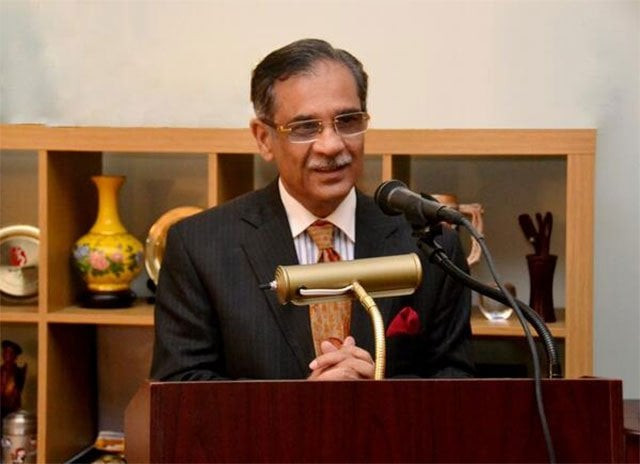'If the govt fails to fulfill its duties, the judiciary will step in'
SC summons chief minister tomorrow to explain steps taken to improve sanitation in Sindh

Chief Justice of Pakistan Mian Saqib Nisar. PHOTO: FILE / EXPRESS
In a democratic system, the judiciary plays the role of custodian and if any state institution fails to perform its duties, the Supreme Court will question it, the top judge said, expressing dismay over the failure of the Sindh government to provide clean drinking water and sanitation conditions across the province.
A three-member bench, which also comprised justices Faisal Arab and Sajjad Ali Shah, took up a case on Monday regarding the implementation of recommendations and suggestions of a SC-appointed judicial commission to provide clean drinking water, improve sanitation conditions and save the environment.
"During the course of [the] hearing, we find it expedient that in order to seek the implementation of the report submitted by the commission and to determine whether positive steps have been taken by the government in this context and, since a satisfactory reply in this regard is not forthcoming on behalf of the government of Sindh, therefore, we direct that the chief minister be present before this court on the next date of hearing," ordered the bench.
Task force formed to clear rain water in District Central
The provincial advocate-general informed that the CM would be in Islamabad today (Tuesday), which is the next hearing, the bench directed the provincial chief "to ensure his presence before the court on December 6 [tomorrow]."
The apex court wondered why 88% of the people in Larkana, the political base of the ruling party, were being supplied filthy drinking water. Expressing his dismay over the state of affairs in Sindh, the CJP remarked that the performance of the elected representatives was beyond his understanding.
He made it clear that the court was not against anyone. We do not want to issue any order to which someone might say 'why I was ousted,' he said, making an oblique reference to former prime minister Nawaz Sharif's speeches targeted at the apex court since his disqualification in the Panama Papers case.
He told the law officer that the court will pass an order according to the law after hearing everyone.
Sindh governor downplays Pakistan’s water woes at international conference
The CJP told the law officer that the matter related to the lives of the people, which cannot be ignored, adding that if the lives of the people were exposed to danger and the court could not remain silent.
The bench said the CM will be asked to explain what steps he had taken to resolve the problems related to supply of potable drinking water and sanitation, adding that the CM's presence in court will lead towards the resolution of these problems.
At the outset of the hearing, the petitioner, Advocate Shahab Usto, said that according to the commission's report, up to 80% people in Karachi, 85% in Hyderabad, 88% in Larkana and 78% in Shikarpur were drinking polluted water.
He told the judges that the toxic and hazardous sewage as well as the waste produced by hospitals and industries was being dumped into water tributaries. Usto alleged that the residents of the province's 29 districts were being forced to drink polluted water.
Industrial effluent affecting underground water quality, experts say
Justice Nisar observed that water and air are the two major blessings on Earth without which life cannot exist. "It is the duty of the state to discharge its responsibility in protecting [these blessings]," the top judge observed. "But, we have disturbed these blessings," he remarked with concern.
He noted that the pollution generated by factories was seriously affecting people's lives, be it in Sindh or Punjab, adding that air pollution was resulting in fatal diseases like cancer.
The top judge declared that serious problems like air and water pollution cannot be compromised on.
He observed that the judiciary had to intervene when the government failed to discharge its obligations.
The bench inquired from the provincial advocate-general and chief secretary as to the volume of funds that had been released by the provincial government for development schemes. It asked why those responsible for resolving these public issues were not resolving them.
The upset top judge questioned why those who go to the public and make tall claims and see the problems being faced by the people cannot provide clean drinking water to the citizens.
Pakistan at threshold of water scarcity
Usto said 80,000 people were suffering from hepatitis in Sindh. He said the government had set up the North Sindh Urban Services Corporation (NSUSC) to provide clean drinking water and improve sanitation conditions in six cities of the province but 800 appointments in the corporation were made on the basis of political affiliations.
Justice Nisar said the authorities concerned in the NSUSC will be held accountable for spending public money.
The bench members observed that the apex court wanted children of the province to get clean drinking water. They remarked that if the chief secretary was unable to resolve these problems, the court may summon the chief minister to answer its queries.
The bench members also expressed their displeasure over failure of the Sindh Assembly speaker to show members of the House a video made during inspections of various cities by the commission's head that depicted filth on the streets, sewage and industrial and hospital waste being dumped into the water bodies.
Justice Nisar said the court could order the Pakistan Electronic Media Regulatory Authority to air the video on television channels if the authorities were not interested in showing the same to the legislators.



















COMMENTS
Comments are moderated and generally will be posted if they are on-topic and not abusive.
For more information, please see our Comments FAQ